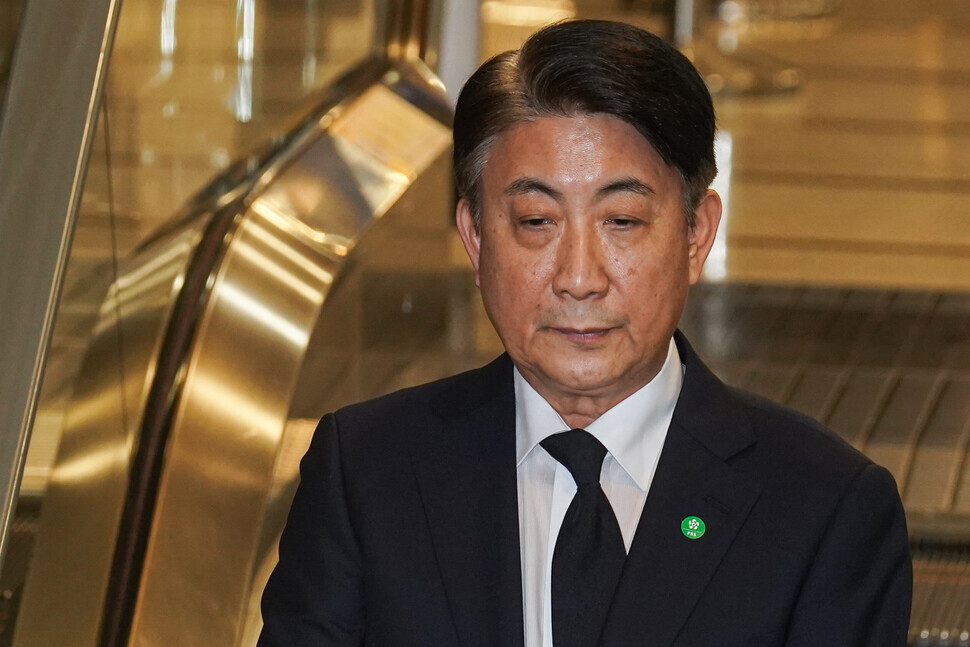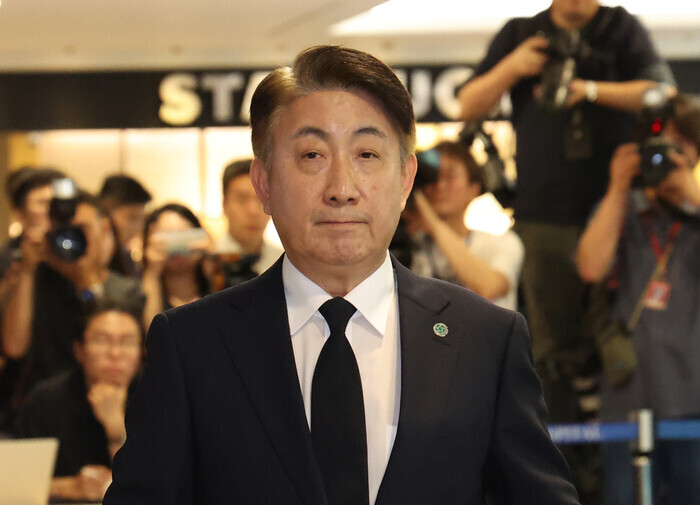hankyoreh
Links to other country sites 다른 나라 사이트 링크
Nominee to lead Korea’s broadcast regulator sees need to foster “warriors” for conservativism

Lee Dong-kwan, the current nominee to chair the Korea Communications Commission (KCC), has expressed a belief in the need to “educate and nurture warriors for conservative ideas.”
As an institution, the KCC is supposed to uphold the public nature of broadcasting and operate independently to that end. Lee’s remarks appear certain to raise serious questions about his fitness as a prospective chairperson, since they amount to him declaring his intent to “educate and nurture” others in a particular ideology.
Adding to the concerns about the KCC’s future under Lee is evidence of him exerting influence beyond the scope of his duties as a past Blue House spokesperson. These activities extended to all aspects of government, including the proposal of response measures following nominations by the Grand National Party (the previous incarnation of the currently ruling People Power Party).
In a written response received on Wednesday by the office of Democratic Party lawmaker Lee Jong-mun, Lee replied to a question on whether he “still holds the same opinion expressed in the book ‘Equality Strikes Back,’ where [he] wrote that the ‘education and nurturing of warriors for conservative ideas is an endeavor that can no longer be put off.’”
“There has been no change in my thoughts,” he answered.
“I believe that capabilities need to be strengthened through education and training by parties and civic groups,” he added.
As a consensus-based administration institution intended to promote broadcasting freedom and public service, the KCC puts particular emphasis on political independence among its standing committee members, including its chairperson.
This is why Article 10 of the Korea Communications Commission Act stipulates that individuals cannot serve on the commission if they are a “party member,” a “person for whom three years have not passed since his/her resignation from public office he/she held through an election,” and a “person for whom three years have not passed since he/she lost his/her position as a member of the Presidential Transition Committee.”
During the Lee Myung-bak presidency, Lee Dong-kwan was singled out by opposition parties and media groups as being responsible for an attempt to seize control of media by branding public broadcasting journalists and producers who did not suit the administrations’ tastes as “left-leaning figures” and driving them out.
While Lee was a Blue House spokesperson, his office also proposed response plans for National Assembly elections.
Lee Jong-mun’s office acquired a copy of a “weekly major media reporting analysis” document dated March 15, 2008. In a section marked “Regarding Grand National Party nominations,” the Blue House spokesperson’s office wrote about the “need to accurately assess trends of popular attitudes in response to the candidacy of those not included [in nominations]” and the “need to devise suitable appointment measures to head off independent runs.” In other words, Lee Dong-kwan’s office advised the Blue House to create positions for party figures who had not received nominations in order to prevent them from running as independents.

There are also allegations that Lee gave a false response to the National Assembly in response to an attempt to request an appointment through his wife.
According to a court ruling in the case involving an indictment on charges including attempted appointment solicitation, an individual identified as “K” gave Lee’s wife 20 million won in cash and a CV in the hopes of obtaining a position. K also met with Lee later on to inquire about the appointment request.
But when asked by Democratic Party lawmaker Jo Seoung-lae whether he had met the individual soliciting an appointment, Lee replied that he had not.
On Wednesday, Lee filed a criminal complaint against a YTN executive over the use of his photograph as a background image for a report on a car rampage and knife attack in Bundang. He also filed a civil suit requesting 300 million won in damages.
After the incident, the network expressed “deep dismay to the viewers and Lee Dong-kwan.”
Lee has gone ahead with a legal response, insisting that he experienced “severe psychological distress as a result of the broadcasting incident” and that there were “suspicions that [the action] was deliberate, as the network in question has one-sidedly presented reports finding fault” with him since his selection as a candidate for KCC chairperson.
By Yoon Yeon-jeong, staff reporter; Ko Byung-chan, staff reporter; Kang Jae-gu, staff reporter; Choi Sung-jin, staff reporter
Please direct questions or comments to [english@hani.co.kr]

Editorial・opinion
![[Editorial] Penalties for airing allegations against Korea’s first lady endanger free press [Editorial] Penalties for airing allegations against Korea’s first lady endanger free press](https://flexible.img.hani.co.kr/flexible/normal/500/300/imgdb/original/2024/0502/1817146398095106.jpg) [Editorial] Penalties for airing allegations against Korea’s first lady endanger free press
[Editorial] Penalties for airing allegations against Korea’s first lady endanger free press![[Editorial] Yoon must halt procurement of SM-3 interceptor missiles [Editorial] Yoon must halt procurement of SM-3 interceptor missiles](https://flexible.img.hani.co.kr/flexible/normal/500/300/imgdb/child/2024/0501/17145495551605_1717145495195344.jpg) [Editorial] Yoon must halt procurement of SM-3 interceptor missiles
[Editorial] Yoon must halt procurement of SM-3 interceptor missiles- [Guest essay] Maybe Korea’s rapid population decline is an opportunity, not a crisis
- [Column] Can Yoon steer diplomacy with Russia, China back on track?
- [Column] Season 2 of special prosecutor probe may be coming to Korea soon
- [Column] Park Geun-hye déjà vu in Yoon Suk-yeol
- [Editorial] New weight of N. Korea’s nuclear threats makes dialogue all the more urgent
- [Guest essay] The real reason Korea’s new right wants to dub Rhee a founding father
- [Column] ‘Choson’: Is it time we start referring to N. Korea in its own terms?
- [Editorial] Japan’s rewriting of history with Korea has gone too far
Most viewed articles
- 160% of young Koreans see no need to have kids after marriage
- 2[Editorial] Penalties for airing allegations against Korea’s first lady endanger free press
- 3Presidential office warns of veto in response to opposition passing special counsel probe act
- 4Hybe-Ador dispute shines light on pervasive issues behind K-pop’s tidy facade
- 5Anti-immigration candidate marauds across Korea with squad detaining foreigners
- 6Months and months of overdue wages are pushing migrant workers in Korea into debt
- 7Alleged drug use by Korean A-listers rocks nation – but not for the first time
- 8[Column] Unsettling moves by the UN Command lay way for Korean involvement in Taiwan
- 9[Reporter’s notebook] In Min’s world, she’s the artist — and NewJeans is her art
- 10Bills for Itaewon crush inquiry, special counsel probe into Marine’s death pass National Assembly